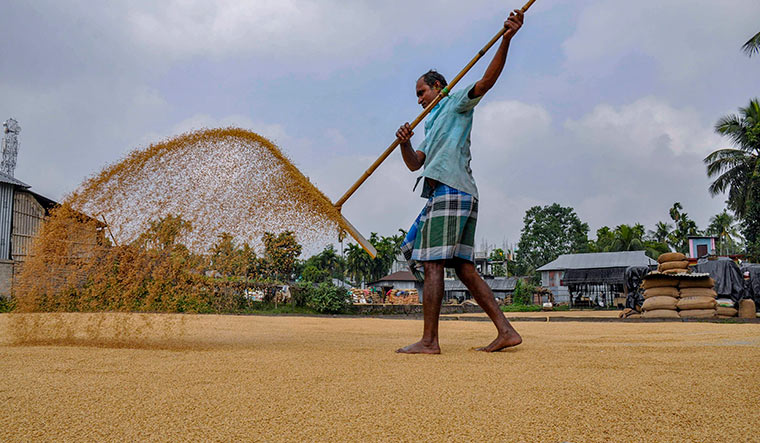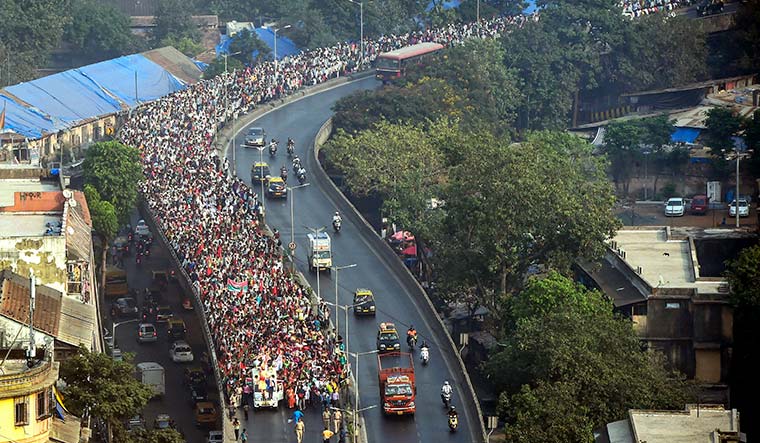The polished brass signboard on the first floor of the Krishi Bhavan in Delhi reads “Ministry of Agriculture and Farmers’ Welfare”. Prime Minister Narendra Modi had renamed the old ministry of agriculture two years ago on an Independence Day. The rechristening rekindled hope among millions of farmers who had voted for the BJP in 2014, but even as the Modi government is about to complete its term, nothing much has changed for them. More than 10,000 debt-ridden farmers have killed themselves since 2015, and lakhs have marched into the cities in protest. Those in Madhya Pradesh, Chhattisgarh and Rajasthan chose to vote against the BJP in the recent assembly elections.
The monsoons have been good, and the harvests bountiful. But it has led to a glut, causing a drop in the prices of rice, wheat, oilseeds, pulses, millets, onions and fruits. Consumer food prices fell by 0.86 per cent in October and 2.6 per cent in November. In December, they fell further by 2.51 per cent, the lowest prices in six years. The monthly food inflation data is in tandem with farmers’ complaints of prices crashing with regularity and triggering a crisis.
The government tried to help by hiking the support price of 22 crops, some of them by 50 per cent. “Both production and procurement of pulses and oilseeds in the last four years have been phenomenal,” said agriculture secretary Sanjay Agarwal. “Compared to Rs3,117 crore worth oilseeds and pulses procured between 2009 and 2014, the government procured pulses and oilseeds for Rs44,142.50 crore from 2014-15 till 2018-19. Because of this, individual farmers got an extra income of Rs80,000 this year,” he said.
Farmer leaders said the statistics did not reflect reality. “The Food Corporation of India could not procure, since its warehouses were full. This caused prices to crash,” said Rakesh Tikait, national president of the Uttar Pradesh-based Bahujan Kisan Dal. Ashok Gulati, former member of the Commission for Agricultural Costs and Prices which fixes minimum support price (MSP), said, “You can include 50 crops under the MSP procurement programme or you can hike their prices by 100 per cent. But, it would only do more harm than good, as farmers would concentrate on producing MSP crops alone.”
The government gave out soil health cards to 15 crore farmers, allocating Rs2,000 crore for organic farming, building rural roads and water canals and introducing crop insurance schemes which initially covered five crore farmers. But none of that seems to have helped.
The newly-elected Congress governments in Madhya Pradesh, Chhattisgarh and Rajasthan have moved ahead boldly, announcing farm loan waivers within days of taking charge. Modi initially mocked them as lollipops, but there seems to be a rethink after BJP president Amit Shah conveyed the concerns of the party cadres to the prime minister. The feedback made it clear that loan waiver was indeed the route to farmers’ hearts. In Bihar, the BJP performed well in 2016 by promising loan waiver. The Yogi Adityanath government in Uttar Pradesh averted a major farmer agitation last year by waiving Rs36,359 crore owed by 86 lakh farmers. Chief Minister Devendra Fadnavis of Maharashtra won much praise for waiving farm loans worth Rs34,000 crore.
So, on December 27, Modi called a meeting with Shah, Finance Minister Arun Jaitley and Agriculture Minister Radha Mohan Singh to find a way to resolve the issue. Members of the NITI Aayog and the Prime Minister’s Economic Advisory Council (PMEAC) were also present. One of the steps discussed in the meeting was to make the crop insurance scheme more farmer-friendly. The meeting also considered offering income compensation for farmers based on their land holding, like the Telangana government has been doing under its Rythu Bandhu scheme.
Kiran Vissa of the Telangana-based Rythu Swarajya Vedika said the Rythu Bandhu scheme did not include the landless and marginal farmers. “The landed and big farmers go in their Mercedes to receive income support cheques. Farmer suicides in Telangana have not abated after the scheme was introduced. It is a bad example to replicate,” he said.
Another option being considered is a one-time settlement of debts which, the finance ministry estimates, would cost Rs3.3 lakh crore. But most farmers borrow from private lenders and the government cannot pay those back. It could also bankrupt Jaitley’s treasury. Already bad farm loans, which increased from Rs48,800 crore in 2016 to Rs60,200 crore in 2017, are hurting the banks. And the government, which has already overspent its current budget, is in no position to levy new taxes as it will be presenting only a vote on account this time.
Meanwhile, there is much confusion among the policy-makers and advisers. The NITI Aayog had maintained that farming was not a “progressive activity”, devising policies that could lure more farmers out of agriculture. A member of the PMEAC had argued that high debt did not drive farmers to suicide, pointing to the fact that villagers still bought up close to half the consumer goods in the market. Gulati, however, said such trends need not last long. “Aspirations and cost of living have increased in villages, but incomes have fallen. This can disturb India’s growing consumer demand story,” he said.
A recent study by India Ratings showed that loan waivers could cripple the states’ capacity to spend on infrastructure and services. Capital spend by states is a major growth driver of the Indian economy. Historically, state governments’ capex has always been higher than the Centre’s, but that could change now. “During periods of fiscal adjustment, like the one that is bound to arise due to farm loan waivers, capex becomes a soft target for deficit control. This has already been witnessed in Maharashtra, Rajasthan and Karnataka, which announced farm debt waivers outside the budget last year,” said Devendra Pant, chief economist, India Ratings.
Farmer leaders advise measures other than loan waivers. “Farmers are not interested in waivers,” said Avik Saha, co-convener of the All India Kisan Mukti Morcha. “They need remunerative prices and a one-time write-off of the indebtedness they have come to suffer over these years. Waiving off a small part of their loans is like offering a headache pill to a cancer patient.”
Farmers are seeking legislative recourse to their woes. The All India Kisan Sangharsh Co-ordination Committee has proposed two bills seeking freedom from indebtedness and guaranteed MSP. The bills were introduced as private member’s bills by Lok Sabha MP Raju Shetti of the Swabhimani Paksha from Maharashtra and K.K. Ragesh, Rajya Sabha MP of the CPI(M) from Kerala. The bills are yet to be taken up for discussion. A delegation of farmers met President Ram Nath Kovind seeking a special session of Parliament to discuss the bills. Said Atul Kumar Anjan, senior CPI leader who heads All India Kisan Mazdoor Sabha, “We told the president that farmers were particularly hassled about the fact that even 14 years after the submission of the report of the National Commission of Farmers chaired by M.S. Swaminathan, it has not been taken up for discussion.”



